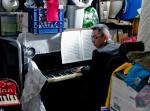Home » Member Page
Alan Chan
Innovative and multi-faceted composer with a global vision
 About Me
About Me
”The four movements of Moon Walk…are full of small and large wonders.” — Los Angeles Times, August. 2018 / Mark Swed Composer and pianist Alan Chan was the winner of the first ASCAP George Duke Commissioning Prize in 2015. His imaginative composition “Denali World,” conceived while he was an Artist-In-Resident at Denali National Park, was premiered by the 67-piece Symphonic Jazz Orchestra in 2017. He was the receipient of 2023 OPERA America’s IDEA Grant, to develop his first opera Immortal Labia, in collaboration with New York City-based librettist Victoria Moy. He is also a winner of the ArtEZ International Jazz Composition Contest (the Netherlands, 2011), Percussive Arts Society Composition Contests (2004, 2008), together with awards and fellowships from Konstnärsnämnden (Sweden, 2023), the Los Angeles County Arts Commission and Ucross Foundation, among others. For more than a decade, he has been focused on creating genre-defying music for his 17-piece Alan Chan Jazz Orchestra (ACJO), which is comprised of top studio/jazz musicians in Los Angeles. Their debut “Shrimp Tale” album was released in 2014, which received rave reviews and radio plays across the U.S. ACJO appears in Los Angeles venues such as the Baked Potato, Vibrato Grill Jazz, the Huntington, Vitello’s, Catalina Jazz Club, Westin Bonaventure Hotel and the Jonathan Club. His band also presented concerts at the Brooklyn Public Library, Stone NYC and ShapeShifter Lab in New York City. In recent years, Alan Chan began to collaborate with Chinese instrumentalists to explore the possibility of merging jazz, improvisation and traditional Chinese vibes into a dramatic and innovative form. ACJO’s new project “Moon Walk,” with pipa (Chinese lute) virtuoso Min Xiao-Fen (New York City), was premiered in Los Angeles in August 2018 and subsequently on the East Coast in Brooklyn Central Library in New York City in February 2019. “Moon Walk” was selected to be featured at the Jazz Education Network Annual Conference in Orlando in January 2023. It received a review from Mark Swed of the Los Angeles Times. ”Chan has given Los Angeles a jazz big band with an utterly unique tonal personality.” — DownBeat Magazine, February 2014 / Kirk Silsbee The “Camel Walk” project, started in 2016 with the prominent performer of suona (Chinese trumpet) Guo Yazhi (Boston), received its first performance of the complete version on the Marsee Auditorium stage on May 10, 2019. It was subsequently webcasted at JENX, the virtual Jazz Education Network Conference, in January 2021. Professional groups that have presented his works have included Grammy-nominated Brussels Jazz Orchestra, Millennium Jazz Orchestra (the Netherlands), Hong Kong Chinese Orchestra, Taipei Percussion, Taipei City Chinese Orchestra, Symphonic Jazz Orchestra (Los Angeles) and La Jolla Symphony. Alan Chan’s music often takes inspiration from his life experiences around the world, with a take of surprising wittiness and humor. Coming from a classical background, he began composing for jazz big band under the mentorship of Gary Lindsay in Miami, then Vince Mendoza and Shelly Berg in Los Angeles, and Jim McNeely in New York City who fanned his flame of desire to create works for jazz ensembles. As an educator, Alan directed the El Camino College Concert Jazz Band and the Jazz program for five years. He conducted over 120 big band compositions from across jazz style periods in more than 20 concerts in the community. His work as a Music Lecturer and Coordinator of the ECC Jazz Festival has earned him Achievement Award for Distinguished Teaching and Student Learning in December 2017 from Academic Senate. He was also a guest artist and clinician at Hong Kong Academy for Performing Arts (HKAPA), Hong Kong Jazz Summer 2016, and a judge/panelist of international/national competitions such as National Endownment for the Arts (NEA) Grants for Arts Projects, Percussive Arts Society Composition Contests, SCI/ASCAP Student Composition Awards and ASMAC Bill Conti Big Band Arranging & Composing Competition. He is a voting member of the Recording Academy.









